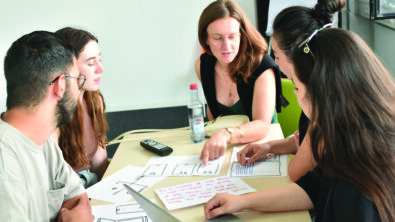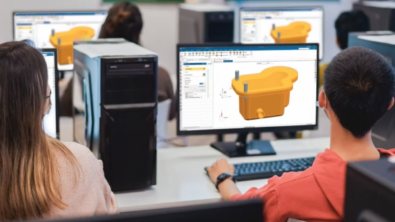HTW Berlin uses Siemens Xcelerator solutions to enable students to tackle future industrial challenges

Focusing on practical and international studies
While demand for skilled professionals, especially in STEM fields, is high across industries, enrollment in STEM subjects, and particularly among women, is decreasing. Hochschule für Technik und Wirtschaft (HTW) University of Applied Sciences for Engineering and Economics Berlin offers practice-oriented degree programs spanning technology, computer science, business, law, culture and design, stemming from institutions dating back to 1874. HTW integrates Siemens Xcelerator software like NX for CAD, Teamcenter for PLM, Plant Simulation for factory planning and Mendix for software design into its engineering curriculum, emphasizing human-centered engineering design to enable students to create comprehensive digital twins.
Benefiting from the Global WiEIT project
A notable initiative within HTW’s portfolio is the Global Women in Engineering and IT (Global WiEIT) project, conducted in collaboration with the University of Technology Sydney (UTS), Swinburne University of Technology and industrial partners. Global WiEIT focuses on increasing women’s participation in engineering and IT careers through innovative teaching methods, creating strong role models and expanding personal networks. Over four years, around 18 fifth-semester bachelor students engage in international cooperation projects, addressing topics like Industry 4.0 and digital twin technology. Funded by the German Academic Exchange Service and the Federal Ministry of Education and Research, students participate in practical courses tackling real-life challenges provided by industry partners, employing studio-based learning to enhance design, communication, and teamwork skills. The projects also include two three-week summer school classes each year which take place in Australia in February and Germany in July. There, students collaborate in international teams, utilizing agile design and lean project management methods. This joint research is supplemented by the cooperative supervision of an academic thesis and a cooperative graduation program with the doctoral candidate and the supervising professors.
Tackling practical projects with industry partners
HTW students collaborate with Australian counterparts on diverse projects, primarily centered around constructing digital twins for smart environments. “Using Siemens software, HTW students gain deeper insights into innovative and future relevant topics such as Industry 4.0, the digital twin and system lifecycle management.” says Doctor of Engineering, Ute Dietrich, professor for information technology and systems engineering at HTW. Some projects focused on data use and communication. Examples include designing virtual spaces for remote work during the pandemic, creating interfaces for real-time product data management and developing solutions for content moderation on online platforms. In industrial contexts, other teams integrated legacy machinery into digital twin systems using Opcenter software, designed robotic end effectors for production tasks and created software for analyzing CAD data to streamline manufacturing processes.
Making real-world improvements
In one project with a German furniture manufacturer, the students used NX to design the digital twin of a modular shelf system, Teamcenter for PLM and Mendix to create an online configurator. “Within our Global Women in Engineering and IT project, students use Siemens software to acquire skills that all industries require to support their future product design and production,” says Dietrich. “Our alumni know how to use system-driven engineering concept development after requirements elicitation to create and build a digital twin and consider products, production systems or services over their product’s lifecycle.
Interested in learning more? Click here to read the full case study
Click here for more information about how Siemens is empowering education and startups


